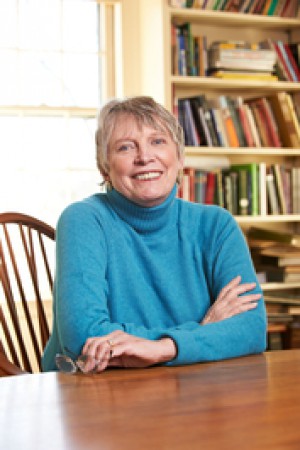Lois Lowry is known for her versatility and invention as a writer. She was born in Hawaii and grew up in New York, Pennsylvania, and Japan. After several years at Brown University, she turned to her family and to writing. She is the author of more than thirty books for young adults, including the...
show more
Lois Lowry is known for her versatility and invention as a writer. She was born in Hawaii and grew up in New York, Pennsylvania, and Japan. After several years at Brown University, she turned to her family and to writing. She is the author of more than thirty books for young adults, including the popular Anastasia Krupnik series. She has received countless honors, among them the Boston Globe-Horn Book Award, the Dorothy Canfield Fisher Award, the California Young Reader.s Medal, and the Mark Twain Award. She received Newbery Medals for two of her novels, NUMBER THE STARS and THE GIVER. Her first novel, A SUMMER TO DIE, was awarded the International Reading Association.s Children.s Book Award. Ms. Lowry now divides her time between Cambridge and an 1840s farmhouse in Maine. To learn more about Lois Lowry, see her website at www.loislowry.comauthor interviewA CONVERSATION WITH LOIS LOWRY ABOUT THE GIVERQ. When did you know you wanted to become a writer?A. I cannot remember ever not wanting to be a writer.Q. What inspired you to write The Giver? A. Kids always ask what inspired me to write a particular book or how did I get an idea for a particular book, and often it’s very easy to answer that because books like the Anastasia books come from a specific thing; some little event triggers an idea. But a book like The Giver is a much more complicated book, and therefore it comes from much more complicated places—and many of them are probably things that I don’t even recognize myself anymore, if I ever did. So it’s not an easy question to answer. I will say that the whole concept of memory is one that interests me a great deal. I’m not sure why that is, but I’ve always been fascinated by the thought of what memory is and what it does and how it works and what we learn from it. And so I think probably that interest of my own and that particular subject was the origin, one of many, of The Giver.Q. How did you decide what Jonas should take on his journey?A. Why does Jonas take what he does on his journey? He doesn’t have much time when he sets out. He originally plans to make the trip farther along in time, and he plans to prepare for it better. But then, because of circumstances, he has to set out in a very hasty fashion. So what he chooses is out of necessity. He takes food because he needs to survive. He takes the bicycle because he needs to hurry and the bike is faster than legs. And he takes the baby because he is going out to create a future. And babies always represent the future in the same way children represent the future to adults. And so Jonas takes the baby so the baby’s life will be saved, but he takes the baby also in order to begin again with a new life.Q. When you wrote the ending, were you afraid some readers would want more details or did you want to leave the ending open to individual interpretation?A. Many kids want a more specific ending to The Giver. Some write, or ask me when they see me, to spell it out exactly. And I don’t do that. And the reason is because The Giver is many things to many different people. People bring to it their own complicated beliefs and hopes and dreams and fears and all of that. So I don’t want to put my own feelings into it, my own beliefs, and ruin that for people who create their own endings in their minds.Q. Is it an optimistic ending? Does Jonas survive?A. I will say that I find it an optimistic ending. How could it not be an optimistic ending, a happy ending, when that house is there with its lights on and music is playing? So I’m always kind of surprised and disappointed when some people tell me that they think the boy and the baby just die. I don’t think they die. What form their new life takes is something I like people to figure out for themselves. And each person will give it a different ending. I think they’re out there somewhere and I think that their life has changed and their life is happy, and I would like to think that’s true for the people they left behind as well.Q. In what way is your book Gathering Blue a companion to The Giver?A. Gathering Blue postulates a world of the future, as The Giver does. I simply created a different kind of world, one that had regressed instead of leaping forward technologically as the world of The Giver has. It was fascinating to explore the savagery of such a world. I began to feel that maybe it coexisted with Jonas’s world . . . and that therefore Jonas could be a part of it in a tangential way. So there is a reference to a boy with light eyes at the end of Gathering Blue. He can be Jonas or not, as you wish.
show less

